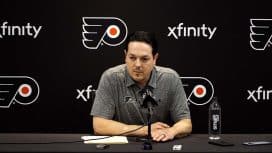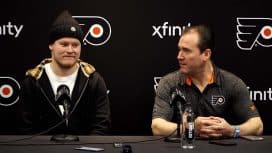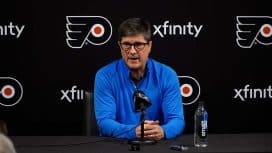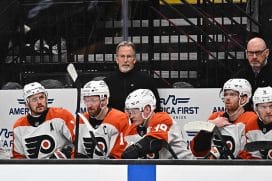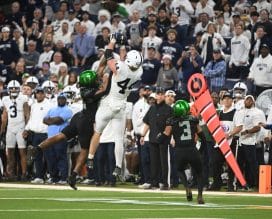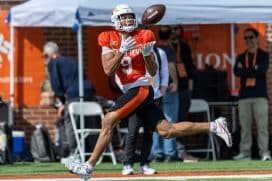Flyers
Masterton Nominee Oskar Lindblom Shares Cancer Journey in SI Article
By Kevin Durso, Sports Talk Philly editor
From the beginning, there was something different about this Flyers team. One noticeable difference was the emergence of Oskar Lindblom. By early December, he was tied for the team lead in goals with 11 and on his way to a career year.
Then, Lindblom’s entire life changed. He was diagnosed with Ewing’s sarcoma in mid-December and it was announced that he would miss the remainder of the season. Instead of being on a quest for the Cup with the rest of his teammates, he was in a battle for his life.
Lindblom, who was named a finalist for the Bill Masterton Memorial Trophy on Thursday, shared his journey to recovery from cancer in an article on Sports Illustrated, detailing the days leading up to his initial testing, the day he learned of his diagnosis, and the recovery process that recently came to a close with his final treatment.
Lindblom was playing some of his best hockey of the season just before the diagnosis. He had scored his 10th goal of the season on Nov. 29, but was evaluated by the Flyers medical staff after discovering a bump along his rib cage. He assumed it was just another bump and bruise from the physical nature of the game, perhaps a cross-check taken during a recent game.
Lindblom didn’t think too much of it, but his girlfriend Alma Lindqvist pushed for him to get it checked out.
He had a CT scan that came back inconclusive, so he received an MRI and biopsy later in the week. For the next four games for the Flyers, Lindblom was medically cleared to play and participated in each game, not yet knowing what the results would be. The wait was agonizing outside of the moments he spent on the ice.
On Dec. 10, the Flyers traveled to Colorado to begin a three-game road trip and Lindblom accompanied them on the trip with his results still not known. Shortly after the team landed and checked into the hotel, Lindblom was called down to the lobby where he was met by the Flyers director of medical services Jim McCrossin and Robert Hagg, a fellow Swede and Lindblom’s closest friend on the team. At that moment, he knew.
“I understood right away that it wasn’t something good,” Lindblom said.
Lindblom, Hagg and McCrossin then went to head coach Alain Vigneault’s room where the 23-year-old forward was informed of the results. McCrossin noted that he didn’t know that there was a dry eye in the room after the news was revealed. Vigneault offered to have Lindblom stay on the trip for a few days to be close to teammates. Lindblom instead decided to fly back to Philadelphia, but not after a late night with Hagg where the two friends shared some difficult moments and some lighter moments too.
“That big smile disappeared for a while,” Hagg said. “I could see in his eyes. Everything was empty. He was going to Colorado to play a hockey game and life was normal and everything changed in a couple seconds. We tried to talk about it, but we didn’t know exactly what type of cancer it was, or what the next steps were going to be. I tried to stay positive. That’s the only thing you can do.
“And after a while, he seemed positive too. He just found out half an hour ago that he had cancer, and we were still half-joking with each other. I guess that’s how he is.”
So Lindblom returned home to Philadelphia and then started to learn of the next steps. Luckily, they had found the cancer early and that gave Lindblom a much better chance of beating the disease. Of course, one thought was on his mind throughout the early meetings.
“They told me that they should be able to take the tumor away, and that hopefully my body responds well to chemo and it should be good to go after these six months,” Lindblom said. “My first thought was, ‘Can I play hockey anymore? I don’t know if I can do anything else. That’s my thing.’ But then I realized, this is probably not about hockey anymore. I’ll just be happy if I can live like a normal person afterwards.”
While Lindblom waited for his first treatment, scheduled just before New Year’s, he struggled with the wait, but found some comfort in the brief moments when life felt normal. One such moment was on Dec. 17, one week after he had learned of his diagnosis. The Flyers had returned from a road trip where they lost all three games and were outscored 14-5, one of their worst stretches of the season. Reeling from the struggles on the road, due largely in part to the life-altering news that was received, Lindblom surprised the team with a visit to the morning skate. The Flyers went out that night and defeated the Anaheim Ducks, 4-1, and won the next three games after that.
"I couldn’t play hockey on that whole trip. I was on another planet, it felt like," Hagg said. "But after a few days, I realized that Oskar wanted us to keep going, to keep fighting."
Lindblom also got to return home to Sweden at Christmas to visit with family. He spoke about the difficulty of the first treatments and the exhaustion he felt afterwards. He experienced a lot of the typical side effects of treatments, but started recovering quickly and was able to get out of the house to take long walks or even work out. He even started skating on roller blades.
Throughout this time, with occasional updates to the public that his treatments were going well, the support from the hockey community and Philadelphia Flyers fans was evident. Teammates did their part to help out. Lindblom attended the Flyers game against the Tampa Bay Lightning on Jan. 11 and was shown on the scoreboard watching from a suite. The arena rose to its feet and cheered for over a minute.
“That was unreal,” Lindblom said. “All that love is something I’ll never forget.”
In addition, Flyers fans and hockey fans across the country started supporting the #OskarStrong movement. T-shirts were made that were worn by Flyers players in the locker room. Players from other teams wanted to show their support as well. NBCSN analyst Eddie Olczyk, a colon cancer survivor himself, sported an Oskar Strong shirt during a nationally-televised Flyers game and sent Lindblom a copy of his book. Mario Lemieux, another player who had survived cancer, called Lindblom.
Finally, on March 3, Lindblom started to reach the beginning of the end. By this point, he was a little more than a third of the way through treatments and decided to have surgery to remove the tumor instead of going through radiation therapy. Some of his ribs were reconstructed with Kevlar and mesh to strengthen them. For a few days, the surgery took its toll on Lindblom, but the tests that followed showed that the cancer was no longer visible and had not spread.
Less than a week later, Lindblom was on the ice at Wells Fargo Center in uniform to be part of the team picture and join his teammates. Then the world was turned upside down with the COVID-19 pandemic. The NHL halted play, as did all of the major sports leagues. Given his medical status, Lindblom had to remain isolated for much of the pandemic. On rare occasion, he would get the opportunity to skate.
Then came that special day on July 2. Lindblom took the walk down the hallway to ring the bell, signaling the end of his treatments. All of his nurses were there to watch, wearing Oskar Strong shirts. Lindblom thanked them and pulled out a signed jersey that read “Thank you for everything.”
“Probably the best feeling of my life,” Lindblom said. “That’s a great day I’ll always remember.”
Just a few days before his final treatment, Lindblom had participated in one of the voluntary on-ice sessions that the NHL was having during Phase 2 of their return-to-play plan. The smile was there, as it always is when he’s on the ice. While Lindblom is not a regular participant on the ice just yet, he did attend a team meeting on Monday at the start of Phase 3, standing distanced from the rest of the team in the back of the room. He golfed with teammates recently as well. It remains to be seen if he will be joining the team when they go to the hub city of Toronto to start Phase 4. He won’t be playing, but his teammates still want him to feel like he’s part of the team, especially with a group as tight-knit as this one with a real legitimate chance to make some noise in the NHL’s return.
Even if Lindblom isn’t able to attend, he will be cheering from Philadelphia while continuing to build up his strength and work toward his next goal. He plans to be ready to play when the 2020-21 season kicks off, which currently is targeted for Dec. 1 and hopes to be able to be the player he was this season. Hopefully, it will be the atmosphere that he pictures too — a sell-out crowd at Wells Fargo Center cheering the way they did in January.
“To step on the ice again with all my teammates, to be out there again and know I can play at this level again?” Lindblom said. “That will be sick.”
While the journey is not yet complete, the story was one that swept the hockey world, which is why Lindblom is among the finalist for the Masterton Trophy, given to a player who demonstrates perseverance, sportsmanship and dedication to the game.
"I'm very humbled to be considered for this award that so many courageous and great players have won," Lindblom said in a press release on Thursday. "Seeing the overwhelming support from fans, my teammates and the entire hockey community has been very emotional for me and without a doubt helped me get through this difficult time, and back to being with and doing the things I love."
To get an understanding on the impact that Lindblom has had, just look at veteran head coach Alain Vigneault. On Wednesday, Vigneault was named a finalist for the Jack Adams Award as coach of the year, the fifth time he’s been a finalist, but he called this one extra special and cited the way the team came together in light of Lindblom’s diagnosis and cancer battle.
Lindblom’s story is definitely a special one and has been well-documented throughout the league. It would be fitting for him to take away an award of perseverance after going through such a battle with his outstanding smile and even better perspective on life.
